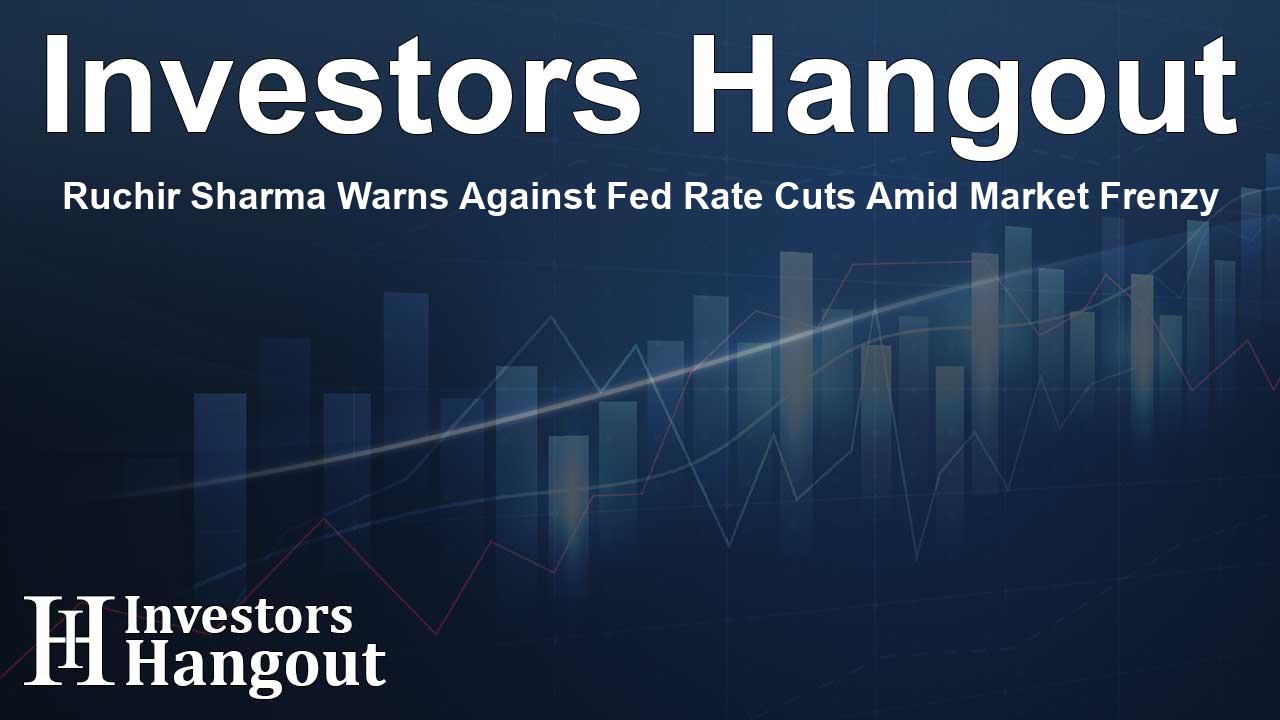Ruchir Sharma Warns Against Fed Rate Cuts Amid Market Frenzy

Ruchir Sharma's Caution on Rate Cuts
Ruchir Sharma, a prominent fund manager and economic commentator, has raised alarms regarding the Federal Reserve's anticipated rate cuts. He believes that these cuts, which are likely influenced by mounting political and economic pressures, could potentially initiate an asset bubble that destabilizes the market.
Financial Conditions and Rate Cuts
In recent discussions, Sharma, who leads Rockefeller International, articulated that the current financial climate is overly accommodating for initiating a new easing cycle. He expressed his views during an appearance on CNBC's 'Squawk on the Street,' emphasizing that the Fed's track record shows it has never cut interest rates under such lax financial conditions.
He stated, "The stock market's obviously very ebullient given the valuations. Credit spreads are close to record lows," underscoring that preceding conditions for rate cuts didn't align with the prevailing economic atmosphere.
Warnings of Speculative Behavior
Sharma further indicated that the speculative behaviors currently observed, particularly centered around artificial intelligence hype, pose significant risks. He remarked, "We have an AI mania building up as far as the market's concerned," stressing the unprecedented nature of the Fed cutting rates amidst such a speculative environment.
Concerns about the labor market and inflation stabilization, cited by Fed officials, have not convinced Sharma. He pointed out, "The Fed has missed its inflation target for five years in a row," suggesting that the current projected rate of inflation might hover around 3% for some time.
The Fiscal Stance's Impact
In his critique, Sharma also dismissed claims that current monetary policy is restrictive, pointing to the federal government's fiscal stance. He highlighted a fiscal deficit of 6.5% of GDP, indicating a stimulative economic environment contrary to what a restrictive policy would achieve.
Political Dynamics Around Rate Cuts
Another aspect of Sharma's commentary focused on the evolving perspective among Republicans regarding the Fed's policies. He expressed surprise at how many in Team Trump, who previously criticized the Fed for its dovish stance, are now advocating for aggressive rate cuts.
Potential Risks to the Labor Market
As the Federal Open Market Committee approaches its next meeting, discussions about rate cuts have gained traction following a recent weaker-than-expected jobs report. Some economists have started to support these cuts; however, not everyone agrees. Notably, economist Peter Schiff warned against the potential adverse effects of a rate cut on the labor market. He noted that weakening the dollar could lead to increased consumer prices and rising long-term interest rates.
Investor Concerns About Fed Independence
Investor Ken Griffin echoed earlier sentiments regarding the ramifications of political interference in the Federal Reserve. He cautioned that undermining the Fed's independence might lead to higher interest rates and inflation, stressing that the U.S. built its economic credibility over an extended period and warned it would be challenging to recover once lost.
Frequently Asked Questions
Why does Ruchir Sharma oppose rate cuts by the Federal Reserve?
Sharma believes that rate cuts could trigger an asset bubble, stressing that current financial conditions do not warrant such measures.
What are the indicators of a speculative market according to Sharma?
Sharma highlights the burgeoning hype around artificial intelligence as a primary indicator of speculative behavior in the market.
How does Sharma view current fiscal policies?
He views current fiscal policies as stimulative, particularly given the federal deficit, which contradicts claims of a restrictive monetary policy.
What consequences does Peter Schiff warn about regarding rate cuts?
Schiff warns that rate cuts could weaken the dollar and lead to higher consumer prices, adversely affecting the labor market.
What concerns did Ken Griffin express regarding the Fed?
Griffin expressed concern that political intervention could undermine the Fed's independence, leading to higher inflation and interest rates.
About The Author
Contact Olivia Taylor privately here. Or send an email with ATTN: Olivia Taylor as the subject to contact@investorshangout.com.
About Investors Hangout
Investors Hangout is a leading online stock forum for financial discussion and learning, offering a wide range of free tools and resources. It draws in traders of all levels, who exchange market knowledge, investigate trading tactics, and keep an eye on industry developments in real time. Featuring financial articles, stock message boards, quotes, charts, company profiles, and live news updates. Through cooperative learning and a wealth of informational resources, it helps users from novices creating their first portfolios to experts honing their techniques. Join Investors Hangout today: https://investorshangout.com/
The content of this article is based on factual, publicly available information and does not represent legal, financial, or investment advice. Investors Hangout does not offer financial advice, and the author is not a licensed financial advisor. Consult a qualified advisor before making any financial or investment decisions based on this article. This article should not be considered advice to purchase, sell, or hold any securities or other investments. If any of the material provided here is inaccurate, please contact us for corrections.
